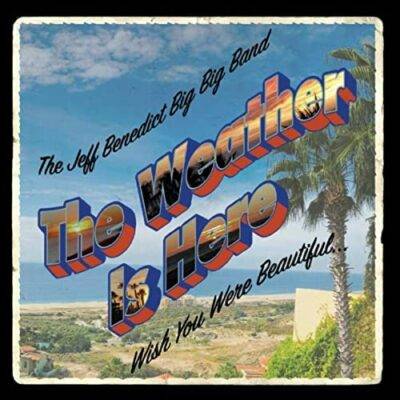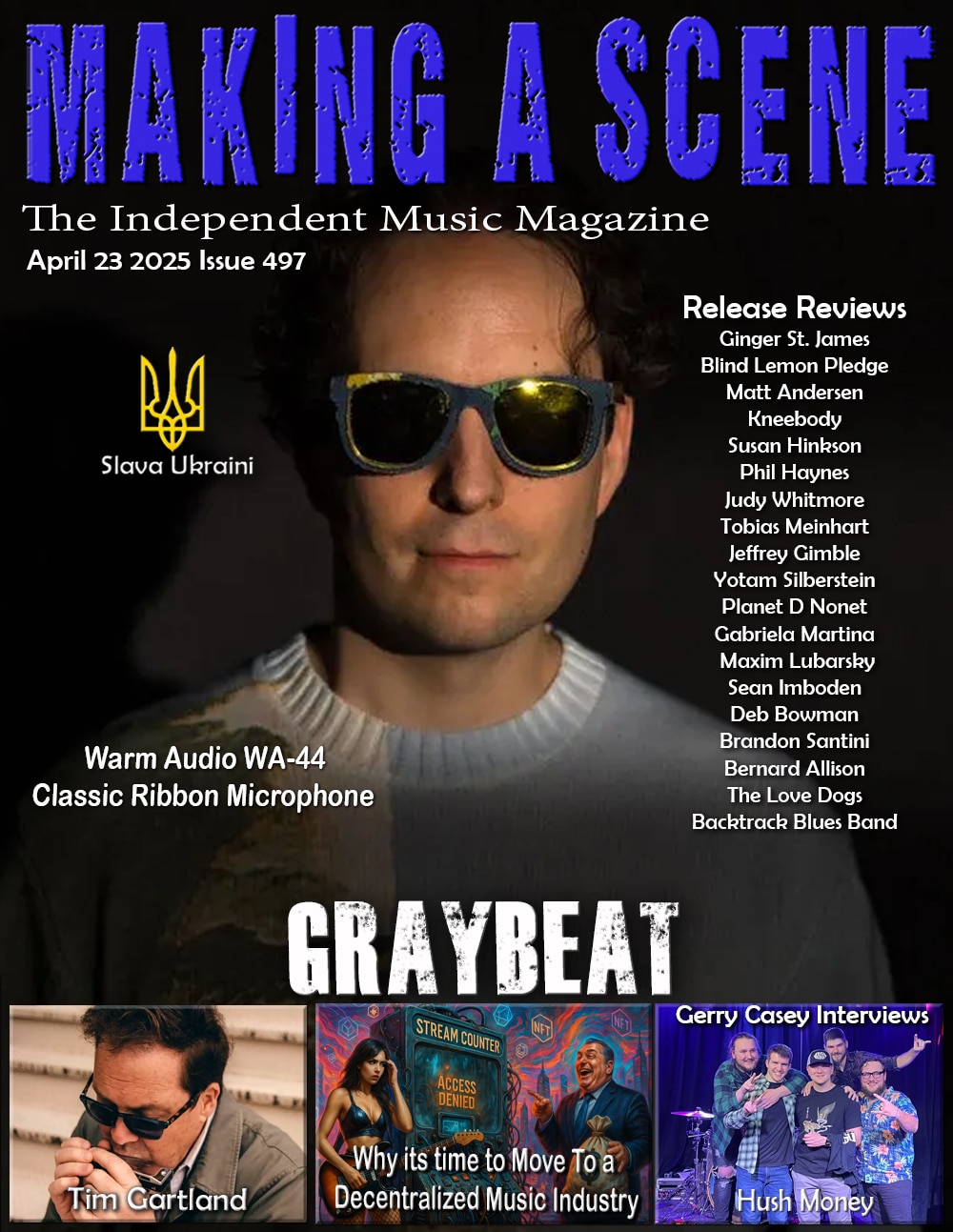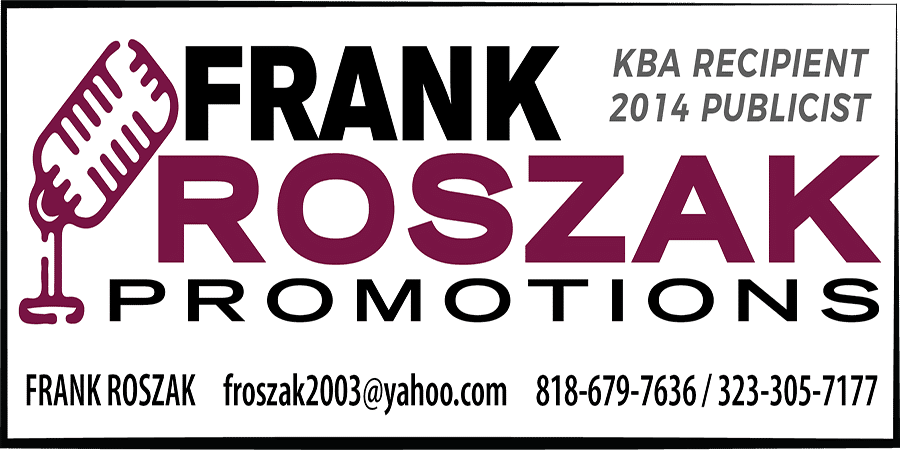The Jeff Benedict Big Big Band The Weather Is Here, Wish You Were Beautiful
 The Jeff Benedict Big Big Band
The Jeff Benedict Big Big Band
The Weather Is Here, Wish You Were Beautiful
Groovy Panda
Last year we brought you Paraphernalia, from the Dave Askren/Jeff Benedict Quartet as their tribute to the music of Wayne Shorter. Saxophonist/composer/arranger Benedict is a 30-year veteran of the L.A. music scene and is an educator at California State University. Benedict has authored numerous projects in various configurations, of which The Weather Is Here, Wish You Were Beautiful is the second for his Big Big Band. This one reflects the influences of Quincy Jones, Pat Metheny, Michael Brecker, Cannonball Adderley, and Phil Woods with four originals and five of his arrangements for a 70’s era big band sound.
The Jeff Benedict Big Big Band is a 17-piece unit that features the aforementioned guitarist Dave Askren and tenor saxophonist Jeff Ellwood who released his fine solo album, The Sounds Around the House late last year, among the ensemble. Benedict plays alto and soprano and features at least two and as many as four soloists on the ten selections.
Leading off is the Benedict original, “Moonscape,” inspired by Michael Brecker and “Steps Ahead.” It’s a minor blues with a bridge featuring solos from Ellwood, Askren, and trombonist Paul McKee. Second is the oft-performed Miles Davis “Nardis,” which Davis wrote for Cannonball and interestingly never performed or recorded in a group that he led. The tune has become most often associated with pianist Bill Evans but this one reflects the funky influence of Cannonball as McKee, Benedict (alto) and pianist Jeff Hellmer take the rollicking solos. They follow with “The Fotomat Song,” more commonly recognized as “Someday My Prince Will Come,” with a different arrangement than that of Miles Davis, who may now be the prime musician associated with the Disney song. Benedict converts it to a samba, and a vehicle for his soprano solo along with McKee again.
Benedict returns to a minor blues for his original, the title track, inspired by the stylish flashiness and oft phony aspects of the L.A. culture. Rife with challenging ensemble passages, the tune also has the most solos of any with turns from Hellmer, McKee, Ellwood, and baritone saxophonist Charlie Richard. The leader stays in the minor blues mode for “Armadillo Research,’ taken at a much more deliberate pace in 12/8 time as Benedict plays his alto, followed by McKee’s trombone and drummer Dean Koba’s solos on one of the two nine-minute plus tracks. “Ant Dance” is another original that owes to Pat Metheny that naturally features Askren’s guitar. It’s in a meter of 9 (3,3,3) with a gradual build buttressed by solos, along with Askren, from Benedict (alto) and the climax to a beautiful piano break from Hellmer.
Irving Berlin’s “Cheek to Cheek” is a vehicle for the saxophone section, a unit that has played together under the name Orion Saxophone Quartet for almost two decades. The arrangement is inspired by Phil Woods and features pianist Hellmer, clocking in at nine and half minutes as the disc’s lengthiest track. “The Mighty Dollar’ is a NOLA type of brass band piece featuring the two Jeffs – Ellwood and Benedict. Instead of the usual tuba, Jerry Amoury renders the bass line on the bass trombone, a more challenging navigation than the tuba.
Perhaps the strongest epitome of the ‘70s theme of this project is L.A. writer Sandy Megas’ “Tom and Jerry,” a reference to the ubiquitous studio mainstays of the time, Tom Scott and Jerry Hey. Yes, it sounds like a film score punctuated by solos from Benedict (also) and Brian Bettger (trumpet). The closer, “Hikky Burr” is from the 1971 Quincy Jones record Smackwater Jack. The heavy blues groove yields energetic turns from trumpeter Steve Hawk, Ellwood, and Askren with potent support from bassist Jonathan Pintoff and the trombone section.
Purposely, this throwback kind of sound is reminiscent of the big bands we used to hear behind so many film and television shows in the ‘70s – blissfully straight-ahead and not quite as adventurous as Thad Jones – Mel Lewis or as colorful as the Toshiko Akiyoshi-Lew Tabackin Big Band, two of the more notable ensembles of the era.
Personnel
Trumpets – Steve Hawk (lead), Kevin Mayse, Brian Bettger, Tom Tallman
Trombones – Paul McKee (lead), Jacques Voyemant, Alex Henerson
Bass Trombone – Jerry Armoury
Saxophones – Jeff Benedict (soprano/alto), Adrian Williams (also), Ken Foerch (tenor), Jeff Ellwood (tenor), Charlie Richard (baritone)
Guitar – Dave Askren; Piano – Jeff Hellmer; Bass – Jonathan Pintoff; Drums and percussion – Dean Koba
- Jim Hynes
Buy Us a Cup of Coffee!
Join the movement in supporting Making a Scene, the premier independent resource for both emerging musicians and the dedicated fans who champion them.
We showcase this vibrant community that celebrates the raw talent and creative spirit driving the music industry forward. From insightful articles and in-depth interviews to exclusive content and insider tips, Making a Scene empowers artists to thrive and fans to discover their next favorite sound.
Together, let’s amplify the voices of independent musicians and forge unforgettable connections through the power of music
Make a one-time donation
Make a monthly donation
Make a yearly donation
Buy us a cup of Coffee!
Or enter a custom amount
Your contribution is appreciated.
Your contribution is appreciated.
Your contribution is appreciated.
DonateDonate monthlyDonate yearlyYou can donate directly through Paypal!
Subscribe to Our Newsletter
Discover more from Making A Scene!
Subscribe to get the latest posts sent to your email.













































